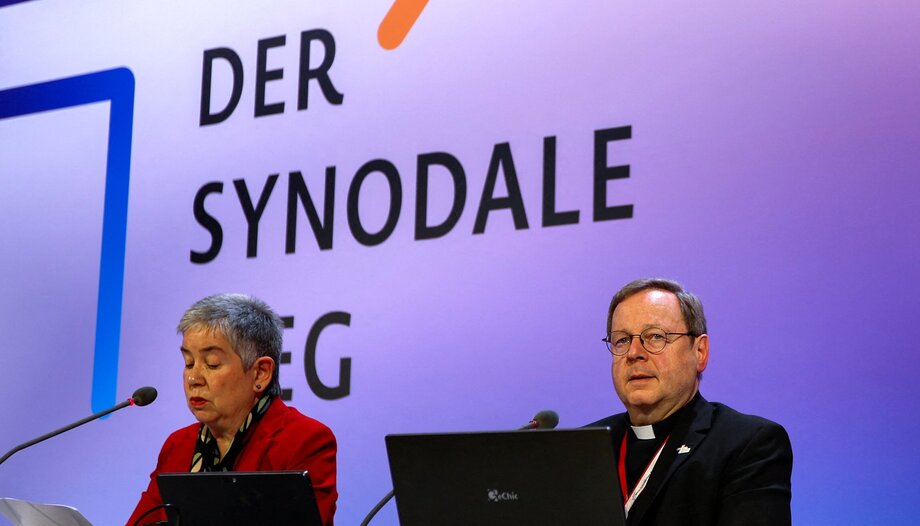On November 11, 2009, the German government established the Committee The aim of the synodal committee is to prepare, for three years, a "Synodal Council" to perpetuate the so-called German Synodal Way. The Central Committee of German Catholics (ZdK) has approved the statutes of this committee; however, the approval of the German Bishops' Conference (DBK) is also required for their entry into force. The discussion of the statutes within the DBK was scheduled for the Spring Assembly, which takes place February 19-22 in Augsburg.
However, this weekend the President of the DBK, Bishop Georg Bätzing of Limburg, received a letter signed by Cardinal Secretary of State Pietro Parolin, as well as by the Prefects of the Dicastery for the Doctrine of the Faith, Cardinal Victor M. Fernandez, and for the Bishops, Cardinal Robert F. Prevost, dated February 16. The letter states that in the interest of "continuing the dialogue that we have already begun, that we will continue in the near future and that Pope Francis has asked us to strengthen", they wish "to express some concerns in this regard and to give some indications that have been brought to the attention of the Holy Father and approved by him".
The cardinals - with the Pope's approval - recall that a Synodal Council "is not foreseen by current canon law and, therefore, a resolution in this sense by the DBK would be invalid, with the corresponding juridical consequences." And they question the authority that "the Episcopal Conference would have to approve the statutes," since neither the Code of Canon Law nor the Statute of the DBK "provide a basis for it." And they add: "Nor has the Holy See issued a mandate; on the contrary, it has expressed the dissenting opinion."
Previously, four German bishops had spoken out against participating in the committee and financing the project through the Association of German Dioceses. According to Bishops Gregor Maria Hanke (Eichstätt), Stefan Oster (Passau), Rudolf Voderholzer (Regensburg) and Cardinal Rainer Maria Woelki (Cologne), the establishment of a synodal committee to prepare a Synodal Council already goes directly against the directives of Pope Francis.
There is no competence to institute a Synodal Council.
The current brief recalls that this was already discussed between the German bishops and the Holy See during the last ad limina visit "and subsequently in the letter of January 16, 2023 from the Cardinal Secretary of State and the Prefects of the Dicasteries for the Doctrine of the Faith and for Bishops, in which it was expressly requested, with a special mandate from the Holy Father, that the creation of such a council should not go ahead." In that letter it was stated: "Neither the Synodal Way, nor an organism designated by it, nor an episcopal conference has the competence to institute a Synodal Council at the national, diocesan or parish level".
Although the current letter does not recall it, both the Holy See and the Holy Father personally referred again later to the "Synodal Council": in a letter Francis sent to four former participants of the Synodal Way, dated November 10, he spoke of "numerous steps by which a large part of this local Church threatens to move further and further away from the common path of the universal Church". Francis included among these steps "the constitution of the Synodal Committee, which aims to prepare for the introduction of a consultative and decision-making body that cannot be reconciled with the sacramental structure of the Catholic Church".
At the end of November, a letter dated October 23, addressed by the Cardinal Secretary of State to the DBK Secretary General, Beate Gilles, was made public. There, Cardinal Parolin affirmed that both the doctrine of reserving the priesthood to men and the Church's teaching on homosexuality - two of the main changes that the Synodal Way wants to introduce - are "non-negotiable."
Approving the statutes would contradict the instruction of the Holy See.
So now the cardinals are once again taking matters into their own hands, given the expectation that the DBK would deal with the Statutes of the Synodal Committee. It is worth noting the continuity between the letter of January 16, 2023 and this one of February 16, 2024: although the persons heading the Dicasteries have changed - Cardinal Victor M. Fernandez for Cardinal Luis Ladaria at the head of the Dicastery for the Doctrine of the Faith; Cardinal Robert F. Prevost in place of Cardinal Marc Ouellet in that of the Bishops - the line followed by the Holy See vis-à-vis the German bishops, the argumentation and even the diction remain the same.
The Holy See speaks very clearly when it is necessary. Thus, in this letter of February 16, one can read, "To approve the statutes of the Synodal Committee would therefore be to contradict the instruction of the Holy See issued by special mandate of the Holy Father and would once again present him with faits accomplis."
Nevertheless, he remains committed to dialogue: he ends by recalling that "last October it was jointly agreed that the ecclesiological questions addressed by the Synodal Path, including the issue of an interdiocesan consultative and decision-making body, would be further discussed at the next meeting between representatives of the Roman Curia and the DBK." If the statutes of the "synodal committee" - he continues - were to be approved before that meeting, "the question arises as to the purpose of this meeting and, more generally, of the ongoing process of dialogue."
The cardinals' letter has had an immediate effect: according to the KNA news agency, which quotes DBK spokesman Matthias Kopp, the president of the Bishops' Conference, Bishop Georg Bätzing, has already informed the other bishops that, for the time being, this item will be removed from the agenda, and that everything else will be decided during the plenary assembly in Augsburg.









